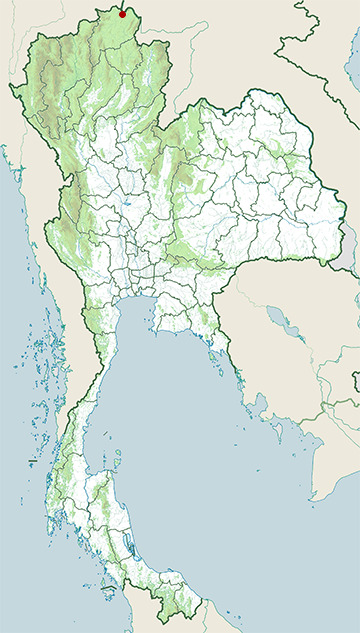Species of Thailand
Firethroat
Calliope pectardens
Armand David, 1877
In Thai: นกเขนน้อยอกเพลิง
The firethroat (Calliope pectardens) also known as David's rubythroat or Père David's orangethroat is a species of passerine bird in the family Muscicapidae, found in western and central parts of China. It breeds in Sichuan, China, and winters primarily in the Indian subcontinent. Its wintering range spans across Bangladesh, Bhutan, India, Nepal, Tibet and Myanmar. Its natural habitat is temperate forests.
It is threatened by habitat loss.
The first formal description of the firethroat was by the Catholic priest and zoologist Armand David in 1877 who coined the current binomial name Calliope pectardens. The species was later placed in the genus Luscinia but when a molecular phylogenetic study published in 2010 found that Luscinia was not monophyletic the genus was split and several species including the firethroat were moved to the reinstated genus Calliope. Calliope, from classical Greek meaning beautiful-voiced, was one of the muses in Greek mythology. The specific name pectardens is from the Latin pectus for "breast" and ardens meaning "fiery" or "glowing".
This article uses material from Wikipedia released under the Creative Commons Attribution-Share-Alike Licence 3.0. Eventual photos shown in this page may or may not be from Wikipedia, please see the license details for photos in photo by-lines.
Category / Seasonal Status
Wiki listed status (concerning Thai population): Accidental
BCST Category: Recorded in an apparently wild state within the last 50 years
BCST Seasonal status: vagrant (non-breeding visitor with three or fewer records)
Scientific classification
- Kingdom
- Animalia
- Phylum
- Chordata
- Class
- Aves
- Order
- Passeriformes
- Family
- Muscicapidae
- Genus
- Calliope
- Species
- Calliope pectardens
Common names
- Thai: นกเขนน้อยอกเพลิง
Synonyms
- Luscinia pectardens
- Erithacus pectardens
- Luscinia davidi
Conservation status

Near Threatened (IUCN3.1)

Near Threatened (BirdLife)

Near Threatened (ONEP)

Near Threatened (BCST)
Photos

Range Map

- Chiang Saen District, Chiang Rai